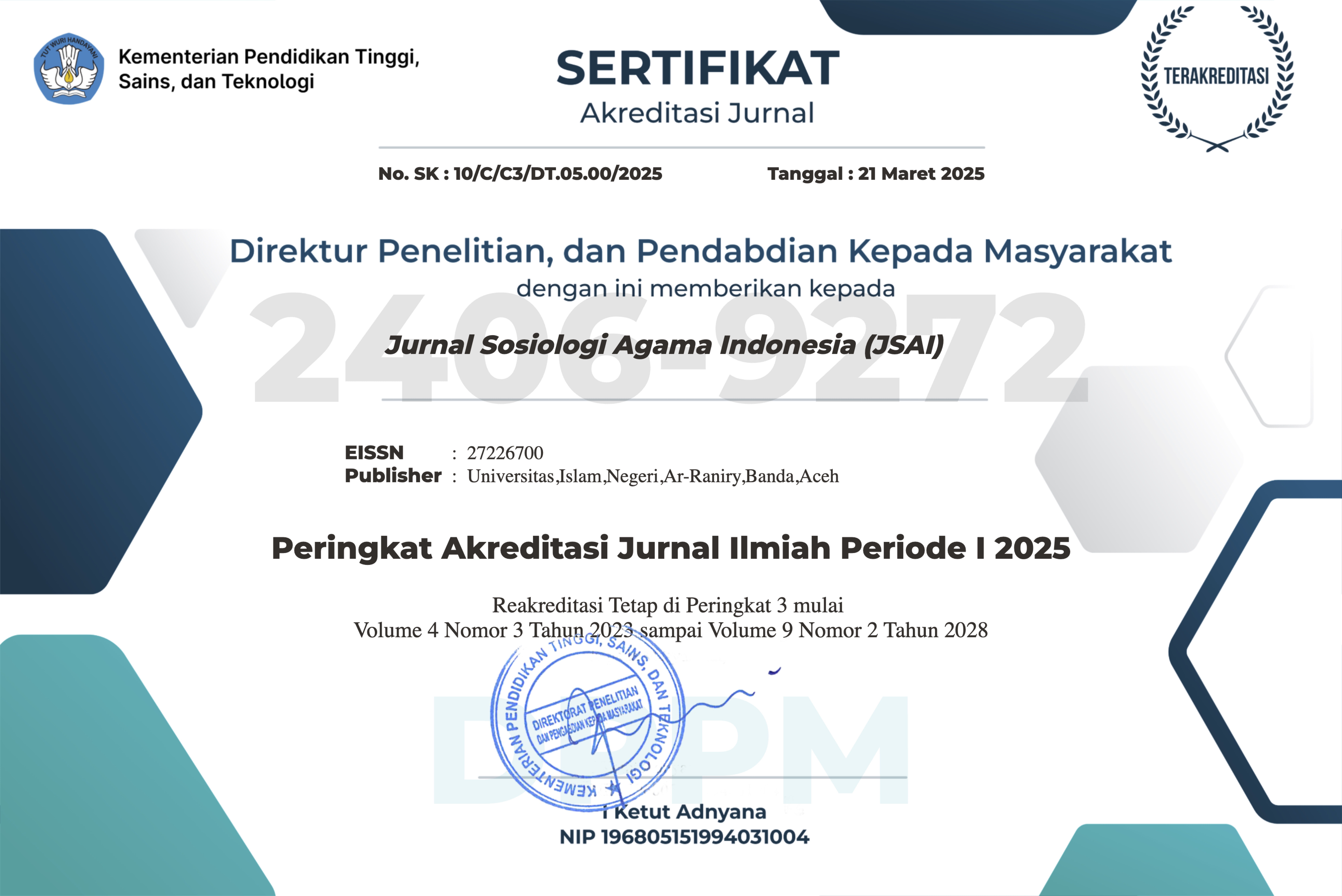The Role of Government Political Approaches in the Growth and Decline of Hardline Islamic Movements in Indonesia
DOI:
https://doi.org/10.22373/jsai.v3i3.2092Keywords:
Islamists, nationalists, government, authoritarianismAbstract
One of the most arduous challenges in the development of Indonesian democracy has been the political contestation between the hardline Islamists vs. secular nationalists. This paper describes how the Indonesian governments dealt with this conflict due to the growing Islamic conservatism and the midst of democratization. For this purpose, this paper examines the controversial government policies during the administration of Soekarno, Soeharto, Soesilo Bambang Yudhoyono (SBY), and Joko Widodo, who governed Indonesia for at least two terms. The analysis of the data collected from various media and research publications describes and compares the political approaches of these presidents in dealing with hardline Islamic movements. Soekarno had to end his primary reliance on democratic debates that resulted in no agreement by issuing an authoritarian decree allowing him to ban the most powerful Islamist party – Masyumi. Soeharto, who implemented iron-fist policies against the Islamists, created stability for badly needed development, but to maintain his power, he had to meet some of the Islamic demands. Due to the reform era, SBY attempted to be more democratic toward the hardline Islamic appeals, leading to his indecisiveness that enhanced the growth of Islamic hardliners. Jokowi uses legal and discursive strategies to uphold secular nationalism. Still, to deal with Islamic radicalism, he used semi-authoritarian approaches such as banning hardline Islamic organizations. This paper concludes that the Indonesian liberal democratic political approaches could enhance Islamic politics and the growth of hardline Islamism. In contrast, authoritarian or semi-authoritarian approaches to secular nationalism created more stability for the growth of moderate Islam in Indonesia.
References
Andriyanto, Heru. 2017. “Rizieq Shihab Named Suspect in Pancasila Insult Case.” Retrieved November 28, 2022 (https://jakartaglobe.id/news/rizieq-shihab-named-suspect-in-pancasila-insult-case/).
Ariffin, Eijas. 2018. “Why Did Jokowi Pick Cleric Ma’ruf Amin?” Retrieved November 28, 2022 (https://theaseanpost.com/article/why-did-jokowi-pick-cleric-maruf-amin).
Assyaukanie, Luthfi. 2013. “Contemporary Developments in Indonesian Islam: Explaining the ‘Conservative Turn.’” Bulletin of Indonesian Economic Studies 49(3):394–95. doi: 10.1080/00074918.2013.850644.
Barton, Greg. 2014. “Indonesia’s Nurcholish Madjid and Abdurrahman Wahid as Intellectual ‘Ulamā’: The Meeting of Islamic Traditionalism and Modernism in Neo-Modernist Thought.” Studia Islamika 4(1). doi: 10.15408/sdi.v4i1.786.
Borgias, Fransiskus. 2012. “Nasakom: Soekarno’s Failed Political Move.” Indonesian Journal of Inter-Religious Studies 1(2):125–48.
Crowley, Sharon. 2006. Toward a Civil Discourse: Rhetoric and Fundamentalism (Composition, Literacy, and Culture). Pittsburgh: University of Pittsburgh Press.
Fealy, Greg. 2020. “Jokowi’s Repressive Pluralism | East Asia Forum.” Retrieved November 28, 2022 (https://www.eastasiaforum.org/2020/09/27/jokowis-repressive-pluralism/).
Fealy, Greg, and Shally White. 2021. “The Politics of Banning FPI.” Www.Newmandala.Org. Retrieved November 28, 2022 (https://www.newmandala.org/the-politics-of-banning-fpi/).
Iseas. 2017. “‘The Disbandment of Hizbut-Tahrir Indonesia: Curbing Islamist Hardliners?’, A Commentary by Deasy Simandjuntak - ISEAS-Yusof Ishak Institute.” Retrieved November 28, 2022 (https://www.iseas.edu.sg/media/commentaries/the-disbandment-of-hizbuttahrir-indonesia-curbing-islamist-hardliners-a-commentary-by-deasy-simandjuntak/).
Al Jazeera. 2021. “Indonesia: Rizieq Shihab Jailed for Concealing COVID Test Result.” Retrieved November 28, 2022 (https://www.aljazeera.com/news/2021/6/24/indonesia-rizieq-shihab-jailed-for-concealing-covid-test-result).
Kahin, Audrey. 2014. “Islam, Nationalism and Democracy: A Political Biography of Mohammad Natsir.” Journal of Social Issues in Southeast Asia 29(1):204. doi: 10.1355/sj29-1j.
Kahin, Audrey. 2012. “Natsir & Sukarno: Their Clash over Nationalism, Religion and Democracy, 1928-1958.” Pp. 191–217 in Encountering Islam: The Politics of Religious Identities in Southeast Asia. ISEAS–Yusof Ishak Institute.
Liddle, R. William. 1996. “The Islamic Turn in Indonesia: A Political Explanation.” The Journal of Asian Studies 55(3):613–34. doi: 10.2307/2646448.
Liddle, R. William. 1999. “The Islamic Turn in Indonesia: A Political Explanation.” Pp. 112–38 in Religion, Globalization and Political Culture in the Third World. London: Palgrave Macmillan UK.
Maarif, Ahmad Syafii. 2006. Islam Dan Pancasila Sebagai Dasar Negara: Studi Tentang Perdebatan Dalam Konstituante. Jakarta: LP3ES.
Marshall, Paul. 2018. “Conflicts in Indonesian Islam.” Current Trends in Islamist Ideology 23:122–38.
Menchik, Jeremy. 2016. Islam and Democracy in Indonesia. Cambridge University Press.
Nasir, Haedar, and Mutohharun Jinan. 2018. “Re-Islamisation: The Conversion of Subculture from Abangan IntoSantri in Surakarta.” Indonesian Journal of Islam and Muslim Societies 8(1):1. doi: 10.18326/ijims.v8i1.1-28.
Nolan, Jim. 2022. “Are Indonesia’s ‘Rubber’ Laws Limiting Freedom of Speech?” Retrieved November 28, 2022 (https://www.lowyinstitute.org/the-interpreter/are-indonesia-s-rubber-laws-limiting-freedom-speech).
Nugroho, Johannes. 2017. “Was Gus Dur a Failure as President?” Retrieved November 28, 2022 (https://jakartaglobe.id/opinion/johannes-nugroho-gus-dur-failure-president/).
Okbah, Farid Achmad. 2003. “Peranan Orde Baru Dalam Depolitisasi Umat Islam Sejak 1966--1980 M.” Retrieved November 28, 2022 (https://www.alislamu.com/7/peranan-orde-baru-dalam-depolitisasi-umat-islam-sejak-1966-1980-m/).
Power, Thomas P. 2018. “Jokowi’s Authoritarian Turn and Indonesia’s Democratic Decline.” Bulletin of Indonesian Economic Studies 54(3). doi: 10.1080/00074918.2018.1549918.
Praying For Indonesia. 3017. “Survey Reveals an Increase in Intolerance Among Indonesian Students - Praying for Indonesia.” Retrieved November 28, 2022 (https://www.prayingforindonesia.com/recent-posts/survey-reveals-increase-tolerance-among-indonesian-students/).
Putten, Linda van. 2019. “How Radical Islam Gained a Foothold in Indonesia.” Universiteit Leiden. Retrieved November 28, 2022 (https://www.universiteitleiden.nl/en/news/2019/09/how-radical-islam-gained-a-foothold-in-indonesia).
Radityo, Muhammad. 2018. “Amien Rais Cerita Saat Dia Tumbangkan Soeharto 20 Tahun Lalu.” Merdeka.Com.
Richburg, Keith B. 1999. “The Race Was Megawati’s to Lose, And Against All Odds, She Lost It.” Retrieved November 28, 2022 (https://www.washingtonpost.com/wp-srv/WPcap/1999-10/21/049r-102199-idx.html).
Ricklefs, M. C. 2012. Islamisation and Its Opponents in Java: A Political, Social, Cultural and Religious History, c. 1930 to the Present.
Sari, Haryanti Puspa. 2019. “Menteri Agama: FPI Berkomitmen Setia NKRI Dan Pancasila Halaman All - Kompas.Com.” Retrieved November 28, 2022 (https://nasional.kompas.com/read/2019/11/29/07435231/menteri-agama-fpi-berkomitmen-setia-nkri-dan-pancasila?page=all).
Sedjarah Indonesia. 2008. “Tulisan Soekarno 1926: Nationalism, Islam and Marxism.” Retrieved November 28, 2022 (https://kolomsejarah.wordpress.com/2008/06/22/tulisan-soekarno-1926-nationalism-islam-and-marxism/).
Sirry, Mun’Im. 2013. “Fatwas and Their Controversy: The Case of the Council of Indonesian Ulama (MUI).” Journal of Southeast Asian Studies 44(1):100–117. doi: 10.1017/S0022463412000641.
Suhelmi, Ahmad. 2012. Polemik Negara Islam: Soekarno vs Natsir. Jakarta: UI Press.
Sutley, Stewart, and Robert W. Hefner. 2001. “Civil Islam: Muslims and Democratization in Indonesia.” Pacific Affairs 74(3):459. doi: 10.2307/3557788.
Tempo.co. 2020. “FPI Ban Erodes Civil Freedom, Amnesty Indonesia Says.” Retrieved November 28, 2022 (https://en.tempo.co/read/1418889/fpi-ban-erodes-civil-freedom-amnesty-indonesia-says).
Tempo. 2011. “Syariah Sampai Ujung - Laporan Utama - Majalah.Tempo.Co.” Retrieved November 28, 2022 (https://majalah.tempo.co/read/laporan-utama/137615/syariah-sampai-ujung).
Tiba, Zahara. 2017. “Concept of Islamic Caliphate Grows More Popular Among Indonesian Students: Survey.” Retrieved November 28, 2022 (https://www.benarnews.org/english/news/indonesian/indonesia-militants-10312017181359.html).
Visi Muslim News. 2014. “Ust. Felix Siauw : ‘Yang Merasa Hukum Konstitusi Lebih Tinggi Dari Hukum Allah Sejatinya Merasa Lebih Hebat Dari Allah.’” Retrieved November 28, 2022 (https://news.visimuslim.org/2014/10/ust-felix-siauw-yang-merasa-hukum.html).
VOI. 2021. “In The Era Of President Jokowi, Democratic Resilience Weakened.” Retrieved November 28, 2022 (https://voi.id/en/bernas/34885/in-the-era-of-president-jokowi-democratic-resilience-weakened).
Wartaekonomi. 2021. “Survei: Mayoritas Publik Setuju Pembubaran FPI.” Retrieved November 28, 2022 (https://wartaekonomi.co.id/read335638/survei-mayoritas-publik-setuju-pembubaran-fpi).
Wirajuda, Tunggul. 2020. “Indonesia Officially Disbands the FPI.” Retrieved November 28, 2022 (https://go.kompas.com/read/2020/12/30/213926674/indonesia-officially-disbands-the-fpi).
Downloads
Published
How to Cite
Issue
Section
License
- Authors retain copyright and grant the journal right of first publication with the work simultaneously licensed under an Attribution-NonCommercial-ShareAlike 4.0 International (CC BY-NC-SA 4.0) that allows others to share the work with an acknowledgment of the work's authorship and initial publication in this journal.
- Authors are able to enter into separate, additional contractual arrangements for the non-exclusive distribution of the journal's published version of the work (e.g., post it to an institutional repository or publish it in a book), with an acknowledgment of its initial publication in this journal.
- Authors are permitted and encouraged to post their work online (e.g., in institutional repositories or on their website) prior to and during the submission process, as it can lead to productive exchanges, as well as earlier and greater citation of published work.
















